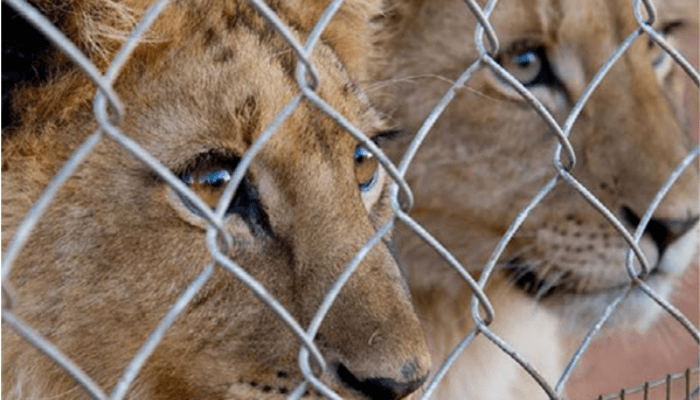 Businessday Ng –
Businessday Ng –
The fabled king of the jungle is on the cusp of extinction and humans are to blame. From encroaching on their habitat to hunting and poaching them, the majestic roar of the lion is disappearing.
At this pace, this generation risks telling the next only about the time when lions roamed and roared. At this pace, within a few years, the pride of the jungle could become extinct.
Scientists say there are now just a little over 50 adult lions left in the wild in Nigeria. Those that remained in the wild are prey to hunters and farmers and real estate developers who invade their natural space.
There was a time when lions roamed forests in northern Nigeria in large numbers, now to see one, you would have to visit Kainji Lake National Park or the Yankari Game Reserve and look across a barbed fence.
The lions there wore their defeat in their solemn stare, eyes morose, idling at the foot of a rustic tree, they look like the spoils of war. Because even these protected areas are safe in name alone.
Today is World Lion Day. Every August 10 is dedicated to raise awareness about the plight of lions. The first World Lion Day came into being in 2013. Since then more lions have died. Maybe now, actions to save them should rank higher in priorities of governments.
In the spirit of World Lion Day, more attention is required on this endangered species to help raise funds and ramp up protective measures. Lions, like other wild life help to maintain balance in the ecosystem, they also provide economic gain by boosting tourism.
Scientifically known as ‘Panthero Leo,’ lions are one of the most well-known and popular animal species out there. They are called the ‘Kings of the Jungle’ due to their arresting and fearsome personality, created by their great bodies and heavy, shiny manes. A lion’s powerful roar is second to none, and it can be heard even five miles away.
Due to the pop culture icons like Simba from “The Lion King”, lions are also loved by children. Organisations appropriate the name to typify its strength and character used in their logos.
“The only problem is there are not that many of them left,” said Peter Knights, Co-Founder and Executive Director – WildAid, a non-profit set up to end the illegal wildlife trade.
While lions existed in large populations 100 years ago, their numbers are just below 50,000 worldwide as a result of poaching and hunting. Some experts say they are even fewer.
Knights said: “Globally, there are about 20,000 lions left in the world. Countries like Tanzania have 8,000 lions which is incredible, but when you come here to Nigeria, unfortunately, it is only 30 to 50 lions left in the wild.
“A lot of the lion reduction has become because of human-wildlife conflict and loss of habitat. So, as more land is taken over for agriculture, people have cattle, sheep, and goats, and then the lions are pushed out,” he said.
The decline is largely due to habitat loss from agricultural expansion and increased human settlement in the savannah landscape.
As Africa’s human population grows exponentially—from 1.2 billion currently to 2.47 billion in 2050—more land is needed to house people and produce the required food to sustain them.
Cultivated land area in sub-Saharan Africa is expected to increase by 21 percent and livestock by 73 percent within this same period. As human occupation of African savannas expands, interactions between lions and humans become more frequent. Lion prey species compete with livestock grazing in Protected Areas (PAs). This has, in turn, led to more frequent interactions between lions and humans.
Livestock herds grazing in or near protected areas compete with lion prey species, and put livestock in close proximity to lions. When lions attack livestock, this can provoke retaliatory killings.
At the same time, prey populations are undergoing drastic declines throughout Africa as a result of bushmeat poaching. Snares and traps set for their prey also often inadvertently catch lions and other predators. An emerging threat is lion poaching for a new trade in lion bones to Asia, used as a substitute for tiger bones.
According to WildAid, Africa’s lions have declined by 43 percent in the past two decades. The lion populations in West, Central and East Africa have declined by 60 percent.
Having lost three-quarters or more oftheir original habitat over the past 100 years, lions are now mostly restricted to protected areas. Lions now occupy only about 8 percent of their historical range.
The organisation also reports that the poaching of lions for their bones and other parts has emerged as a more recent threat. Although lion bones are not part of Traditional Chinese Medicine, as tiger populations decline, these more readily available products are entering illegal wildlife markets as substitutes. Some lions are also killed for trophy.
There is also the challenge with “pet trade (people who want lion cubs), so they kill the lion’s parents to get the cubs and then also the illegal wildlife trade decimates the lion,” said Mark Ofua a veterinarian and conservationist.
Q: Lions, like other wild life help to maintain balance in the ecosystem, they also provide economic gain by boosting tourism.
According to Ofua, lions in Nigeria face the very open risk of extinction because of habitat loss, agricultural activities, human activities, forest encroachment, and illegal logging, which depletes the forest (savannah), and their habitat.
So, habitat loss is at the forefront. Also, very importantly, hunters that go into the bush to set snares for antelopes and other forms also catch the lion, injure them, kill them, and contribute to the decimation, he said.
No safety in Protected Areas
According to a report by WildAid, the lion is now considered conservation dependent, with most remaining lion populations living in and around protected areas.
Africa’s magnificent national parks, game reserves and other protected wildlife landscapes are essential to the species’ survival. However, the general insecurity in African countries including Nigeria has made the parks unsafe. Many protected areas are vulnerable to the same anthropogenic threats that occur in human-dominated landscapes outside their boundaries.
Read also: World Health Day: Air pollution puts millions of Nigerians at risk
As human occupation of African savannas expands, villages are established along, and sometimes within, the protected area borders, and livestock graze within the boundaries. This drives an escalation of human/carnivore interactions which leads to inevitable conflict.
This conflict takes two mainforms. First, livestock grazing in PAs results in competition with lion prey species and can lead to degraded habitat, both of which can drive a reduction in the numbers of native herbivores. Second, lions are more likely to encounter domestic herds and may resort to killing stock, particularly as wild prey numbers are depleted. This, in turn, provokes retaliatory killing of lions by herders and ranchers.
Encroachment of people and their livestock into PAs and the associated pressure on lions is now regarded as one of the top three threats to the species in West, Central, East and parts of Southern Africa. Human encroachment is also associated with illegal bushmeat hunting—another severe threat to both lions and their prey, notes Wild Aid.
The organisation is calling for action to reinforce protected areas which could even be a massive conservation opportunity requiring immense support. If secured, their land area would ensure the long-term survival of the lion and that of many other species.
Economic loss
A country with a healthy lion population can make money from it. Knights said that in East Africa, in a place like Tanzania with 8,000 lions, the country can make a million dollars in the lifetime of a lion from tourism revenue.
“People will love to see lions in the wild, so the hope here in Nigeria is we can protect this population and rebuild them. Eventually, you will be able to go and see wild lions here in Nigeria, in parks like Yankari. WildAid is embarking on a big campaign worldwide about the plight of the lion.
“We are also working in some cases on projects with carbon offsets, where carbon offsets companies in America and in Europe pay to store carbon because they have a carbon footprint, and that money can be used to protect forests and lion habitats and to help local people as well.
“So, we think that is a way in the future that we can help rebuild the lion population of Africa,” Knights said.
Get real time updates directly on you device, subscribe now.
Day Abiodun paid ‘surprise visit’ to Ogun civil servants
With over $6.15trn revenue, 500,000 new jobs, ICRC offers hope to a nation in need of…
Meet Phillip Ozuah who donated $1m to UI
How easy and laundered money clash at sea
Get the best of world News delivered to your inbox daily
latest news
Five things to know to start your Thursday
Rising prices of cocoa, diesel cripple Nigerian processors
SA visa delays scuttle Nigerian applicants’ travel plans
Naira investments suffer inflation, currency risks
Seplat-ExxonMobil saga seen dimming oil sector’s outlook
Business Day, established in 2001, is a daily business newspaper based in Lagos. It is the only Nigerian newspaper with a bureau in Accra, Ghana. It has both daily and Sunday titles. It circulates in Nigeria and Ghana
BDlead
Rising prices of cocoa, diesel cripple Nigerian processors
SA visa delays scuttle Nigerian applicants’ travel plans
Seplat-ExxonMobil saga seen dimming oil sector’s outlook
World Lions Day: When the predator becomes prey – Businessday





